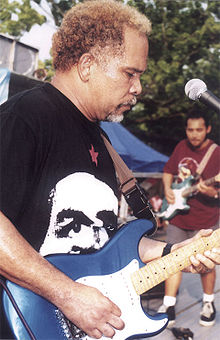Luis Días (composer)
| Luis Días | |
|---|---|

Luis Días
|
|
| Background information | |
| Birth name | Luis Días Portorreal |
| Born |
June 21, 1952 Bonao, Dominican Republic |
| Died | December 8, 2009 (aged 57) Santo Domingo, Dominican Republic |
| Genres | Popular Dominican Music |
| Occupation(s) | Musician, singer-songwriter, composer, guitarist |
| Instruments | Guitar |
| Years active | 1972–2009 |
Luis Díaz Portorreal, best known as Luis Días, was a musician, composer and performer of popular music born in the Dominican Republic.
He was immersed in the popular music and customs of Dominican folklore. In the artistic realms he is known as "El Terror" ("The Terror"), due to his particular performance style and his overtones.
He was the author of lyrics and music that fused many diverse musical styles. In some circles, Luis was considered to be the Father of Dominican Rock, due to his contributions to alternative music and his experimentation with Dominican rhythms blended with rock guitar patterns. In his fusions, Luis accomplished fusions of rock, reggae, jazz and blues with more than 40 ethnic rhythms from the Dominican Republic and Haiti, such as Merengue, Bachata, and Mangulina, among many others.
The composer, guitarist and singer named Luis Díaz Portorreal was born in Bonao, Dominican Republic, on June 21, 1952. Since childhood, he felt a direct impulse to become a musician, given that his father was a Tres player, (an instrument similar to the guitar used in rural Dominican towns), and his mother was a singer of Salves. Lively melodies and rhythms, along with the artistic environment that contained them, were natural surroundings in his life.
He covered his first musical lessons in his own hometown, with the musicians Juan Zorrilla and Tatán Jiménez, and at his 16 years of age he formed his first music band, "Los Chonnys".
In 1970 he changed his residence to Santo Domingo with a main objective of studying Psychology at the Universidad Autónoma de Santo Domingo (UASD).
He died in Santo Domingo on December 8, 2009, after suffering a heart attack and other complications therein. His funeral procession was one of the longest in recent Dominican history, parading through the barrios of Santo Domingo.
In 1972, upon the initiative of the sociologist Dagoberto Tejada, he began as a guitarist and singer in the band Convite, a musical band on a mission to rescue a variety of rhythms found in the island from obscurity. Other original members were Dagoberto himself, Ana Marina Guzmán (singer), José Enrique Trinidad and José Rodríguez (lyrics and backup vocals), Miguel Mañaná (percussion), José Castillo (percussion) and Iván Domínguez (percussion).
...
Wikipedia
